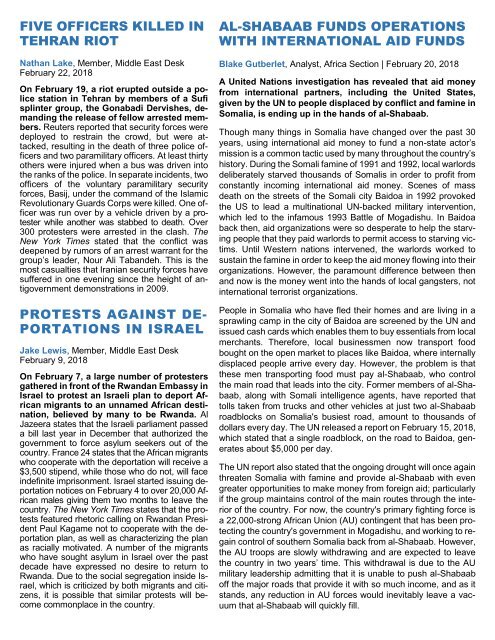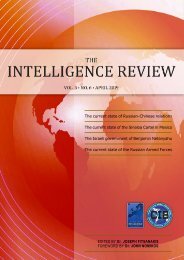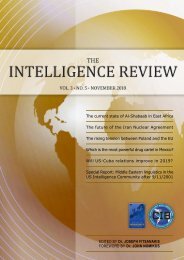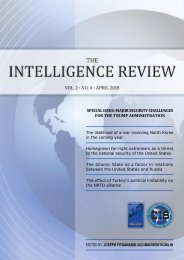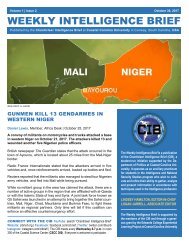CIB Weekly Intelligence Brief | Vol. 02 | Iss. 06
CIB Weekly Intelligence Brief | Vol. 02 | Iss. 06 | 26 February 2018
CIB Weekly Intelligence Brief | Vol. 02 | Iss. 06 | 26 February 2018
You also want an ePaper? Increase the reach of your titles
YUMPU automatically turns print PDFs into web optimized ePapers that Google loves.
FIVE OFFICERS KILLED IN<br />
TEHRAN RIOT<br />
Nathan Lake, Member, Middle East Desk<br />
February 22, 2018<br />
On February 19, a riot erupted outside a police<br />
station in Tehran by members of a Sufi<br />
splinter group, the Gonabadi Dervishes, demanding<br />
the release of fellow arrested members.<br />
Reuters reported that security forces were<br />
deployed to restrain the crowd, but were attacked,<br />
resulting in the death of three police officers<br />
and two paramilitary officers. At least thirty<br />
others were injured when a bus was driven into<br />
the ranks of the police. In separate incidents, two<br />
officers of the voluntary paramilitary security<br />
forces, Basij, under the command of the Islamic<br />
Revolutionary Guards Corps were killed. One officer<br />
was run over by a vehicle driven by a protester<br />
while another was stabbed to death. Over<br />
300 protesters were arrested in the clash. The<br />
New York Times stated that the conflict was<br />
deepened by rumors of an arrest warrant for the<br />
group’s leader, Nour Ali Tabandeh. This is the<br />
most casualties that Iranian security forces have<br />
suffered in one evening since the height of antigovernment<br />
demonstrations in 2009.<br />
PROTESTS AGAINST DE-<br />
PORTATIONS IN ISRAEL<br />
Jake Lewis, Member, Middle East Desk<br />
February 9, 2018<br />
On February 7, a large number of protesters<br />
gathered in front of the Rwandan Embassy in<br />
Israel to protest an Israeli plan to deport African<br />
migrants to an unnamed African destination,<br />
believed by many to be Rwanda. Al<br />
Jazeera states that the Israeli parliament passed<br />
a bill last year in December that authorized the<br />
government to force asylum seekers out of the<br />
country. France 24 states that the African migrants<br />
who cooperate with the deportation will receive a<br />
$3,500 stipend, while those who do not, will face<br />
indefinite imprisonment. Israel started issuing deportation<br />
notices on February 4 to over 20,000 African<br />
males giving them two months to leave the<br />
country. The New York Times states that the protests<br />
featured rhetoric calling on Rwandan President<br />
Paul Kagame not to cooperate with the deportation<br />
plan, as well as characterizing the plan<br />
as racially motivated. A number of the migrants<br />
who have sought asylum in Israel over the past<br />
decade have expressed no desire to return to<br />
Rwanda. Due to the social segregation inside Israel,<br />
which is criticized by both migrants and citizens,<br />
it is possible that similar protests will become<br />
commonplace in the country.<br />
AL-SHABAAB FUNDS OPERATIONS<br />
WITH INTERNATIONAL AID FUNDS<br />
Blake Gutberlet, Analyst, Africa Section | February 20, 2018<br />
A United Nations investigation has revealed that aid money<br />
from international partners, including the United States,<br />
given by the UN to people displaced by conflict and famine in<br />
Somalia, is ending up in the hands of al-Shabaab.<br />
Though many things in Somalia have changed over the past 30<br />
years, using international aid money to fund a non-state actor’s<br />
mission is a common tactic used by many throughout the country’s<br />
history. During the Somali famine of 1991 and 1992, local warlords<br />
deliberately starved thousands of Somalis in order to profit from<br />
constantly incoming international aid money. Scenes of mass<br />
death on the streets of the Somali city Baidoa in 1992 provoked<br />
the US to lead a multinational UN-backed military intervention,<br />
which led to the infamous 1993 Battle of Mogadishu. In Baidoa<br />
back then, aid organizations were so desperate to help the starving<br />
people that they paid warlords to permit access to starving victims.<br />
Until Western nations intervened, the warlords worked to<br />
sustain the famine in order to keep the aid money flowing into their<br />
organizations. However, the paramount difference between then<br />
and now is the money went into the hands of local gangsters, not<br />
international terrorist organizations.<br />
People in Somalia who have fled their homes and are living in a<br />
sprawling camp in the city of Baidoa are screened by the UN and<br />
issued cash cards which enables them to buy essentials from local<br />
merchants. Therefore, local businessmen now transport food<br />
bought on the open market to places like Baidoa, where internally<br />
displaced people arrive every day. However, the problem is that<br />
these men transporting food must pay al-Shabaab, who control<br />
the main road that leads into the city. Former members of al-Shabaab,<br />
along with Somali intelligence agents, have reported that<br />
tolls taken from trucks and other vehicles at just two al-Shabaab<br />
roadblocks on Somalia's busiest road, amount to thousands of<br />
dollars every day. The UN released a report on February 15, 2018,<br />
which stated that a single roadblock, on the road to Baidoa, generates<br />
about $5,000 per day.<br />
The UN report also stated that the ongoing drought will once again<br />
threaten Somalia with famine and provide al-Shabaab with even<br />
greater opportunities to make money from foreign aid; particularly<br />
if the group maintains control of the main routes through the interior<br />
of the country. For now, the country's primary fighting force is<br />
a 22,000-strong African Union (AU) contingent that has been protecting<br />
the country's government in Mogadishu, and working to regain<br />
control of southern Somalia back from al-Shabaab. However,<br />
the AU troops are slowly withdrawing and are expected to leave<br />
the country in two years’ time. This withdrawal is due to the AU<br />
military leadership admitting that it is unable to push al-Shabaab<br />
off the major roads that provide it with so much income, and as it<br />
stands, any reduction in AU forces would inevitably leave a vacuum<br />
that al-Shabaab will quickly fill.


